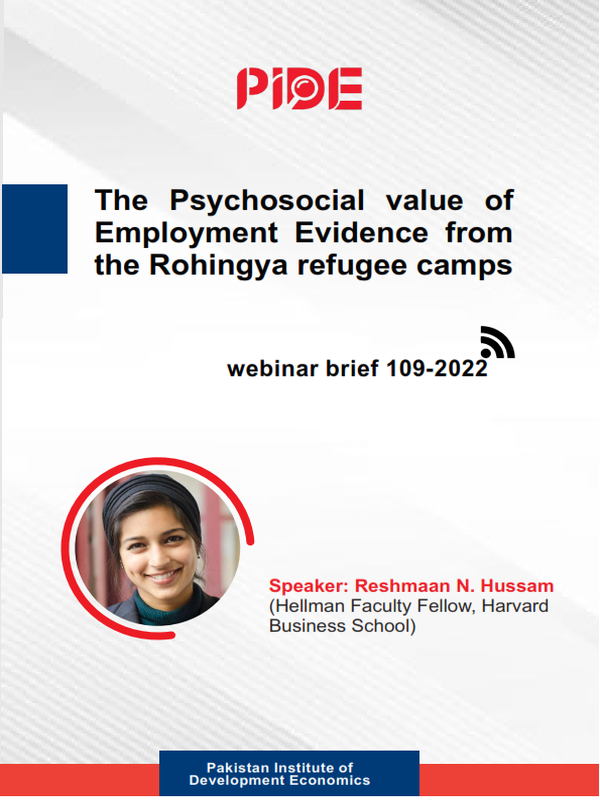
Pakistan Institute of Development Economics
- Home
Our Portals
MenuMenuMenuMenuMenuMenuMenu - ResearchMenuMenuMenuMenuMenuMenuMenu
- Discourse
- The PDR
- Our Researchers
- Academics
- Degree Verification
- Thesis Portal
- Our Portals
The Psychosocial Value Of Employment Evidence From The Rohingya Refugee Camps
Webinar Brief:-
Prepared by: Ayesha Fatima
Speaker: Reshmaan N. Hussam
(Hellman Faculty Fellow, Harvard Business School)
Does employment provide social and Psychological benefits beyond its role as a source of income? Employed and unemployed differ in ways that are likely correlated with well-being. In this webinar, Reshmaan N. Hussam discusses the working paper “psychological value of employment: Evidence from Rohingya refugees.” As income earned from employment has psychological value, it is difficult to isolate its non-pecuniary effect. This paper tackles these challenges and provides a casual estimate of the psychosocial value of employment among the Rohingya refugees of Myanmar.
Background
The government of Myanmar started a massive ethnic cleansing campaign which resulted in the expulsion of 750-800000 Rohingya refugees- the world’s largest refugee camp now. If you go to the people living there and ask them how you can help them? They answer, “help us go back home and give us work.” Many countries in the world, including Bangladesh, does not give work permit to their refugees. They are only allowed to do little informal work. When you lose a job, you not only lose your friends and your identity as a worker but also lose your income, and all these things impact your well-being.To check this, they ran a randomized control trial among 745 Rohingya refugees in Bangladesh by involving them in a random project for eight weeks.
The three categories are:
Control: no work and nominal wage for participation in the survey
Cash: no work and high wage for participation in the survey
Work: wage equal to cash arm for participation in the survey
Work Task
They were given a sheet, and their task was just to observe 15 of the neighbors five times a day and mark the activity they were performing on the sheet without giving their names or any other identity. The same task is to be performed by men and women as well.
- The task completion ratio is 100%
- The task mistake ratio in starting is high, but it reduces to zero over time.
- They were given the penalty that if they made a mistake in the task, they would be docked pay but docked pay ratio is very low.
Finding
- After this project, there was about a 20 % reduction in the frequency of suicidal thoughts among people who are now employed.
- About 88% of people lost their loved ones during this ethnic cleaning campaign. The frequency of depression in those people reduce only by 0.26 SD. It means nothing can compensate their loved ones.
- People who already feel physically sick are okay now. The reduction in depression and mental health translates into better physical well-being.
- The cognitive index also improves.
- The risk aversion goes down. People start taking a risk now.
- The labor supply increase. About 70% of people are willing to do work at zero wage rates.
- The individual in the work group experience increase in their ranking. The individual in the cash group experience decrease in their ranking.
- Men and women both significantly get benefits from work. However, men hardly get benefits from cash, while women get much more benefits.
- Women seem to improve their ranking men have a huge improvement in work and a decline in cash.
Conclusion
These restrictions in to do work are not a temporary problem. 70% of refugees face restrictions on the right to work. There is about 22 million long-term unemployment in the developing world. As when you lose your job, you not only lose your income but also lose your identity as a worker, and this thing impacts your well-being. So this discussion raises the question of what the resilience of all these cash transfer programs is. Whether they have a long-term impact or not?
So there is a need to shift our focus to work rather than on giving unconditional cash transfers. So society needs to create decent employment to create some sort of psychological value beyond this income.
employment to create some sort of psychological value beyond this income.




